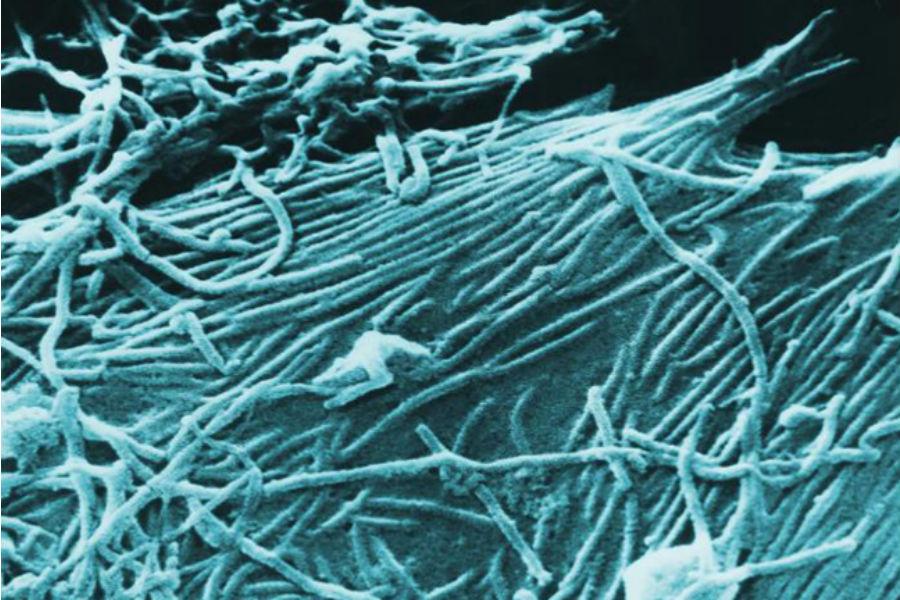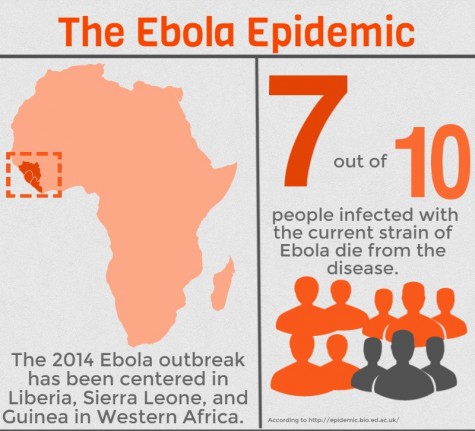Ebola increases student caution
Scanning electron microscopic image of Ebola virions.
Immune systems are not the only things being infected by Ebola: the threat to security has made United States citizens victims of misinformed paranoia.
In 1976, Ebola was first discovered in Sudan and Democratic Republic of Congo. The current outbreak in west Africa is the largest outbreak since the discovery of the virus, according to the World Health Organization (WHO).
According to Centers for Disease Control and Prevention (CDC), more than 10,000 people in Africa have contracted Ebola, primarily in Guinea, Sierra Leone, Liberia, and Nigeria. Almost 5,000 have died as of Oct. 24, 2014.
Symptoms include fatigue, muscle pain, headache, and sore throat, according to WHO. Developed cases include vomiting, diarrhea, rash, and, in extreme cases, internal and external bleeding.
Ebola was originally transmitted through the human population by host animals. According to WHO, fruit bats, chimpanzees, and forest antelope have all been linked to the transmission of Ebola in Africa.
According to WHO, human-to-human transmission occurs via direct contact with blood, organs, secretions, and other bodily fluids and through surfaces contaminated with these fluids, such as bedding or clothing. Nurses and other health-care workers can be infected while treating infected patients.
In mid-September, Thomas Eric Duncan, a Liberian infected with Ebola, traveled from Liberia to Dallas. After visiting Texas Health Presbyterian Hospital with a mild fever, a headache, and abdominal pain, he was sent home with a diagnosis of a “low-grade, common viral disease,” according to the hospital report.
Duncan then returned to the hospital because of his worsening symptoms, and, on Sept. 30, the Centers for Disease Control and Prevention (CDC) confirmed his Ebola diagnosis during a new conference. Duncan died on Oct. 8, the first person to have died of Ebola in the United States.
The CDC conducted a follow-up to test Duncan’s nurse, Nina Pham. On Oct. 11, Pham tested positive for the virus, becoming the first person-to-person transmission of Ebola in the United States.
Healthcare officials and the CDC have been reviewing current protocols regarding handling Ebola patients.
Pham’s contraction “doesn’t change the fact that it’s possible to take care of Ebola safely, but it does change, substantially, how we approach it,” CDC Director Tom Frieden said in an USA Today article.
On Oct. 16, Pham was moved to a National Institute of Health isolation unit in Bethesda, Maryland.
In the JC halls, people talk about Ebola. “Ebola doesn’t scare me yet. It actually makes me feel thankful that none of my loved ones have been affected by the awful disease,” senior Ashley Hunter said.
Although she isn’t taking any special measures, like stopping sharing drinks, she does understand the possible calamity.
Meanwhile, on Oct. 10, Amber Vinson, a Texan Health Presbyterian Hospital nurse, who helped treat Duncan, boarded a flight to Ohio with over 100 other people. Although the CDC was at that time still watching health-care officials who came into contact with Duncan, Vinson was not warned to stay off the plane.
Frieden, during a press phone call on Oct.13, stated that “[Vinson] should not have traveled on a commercial airline.”
On Oct. 15, Vinson, tested positive for the Ebola virus, according to the CDC.
Passengers of the Oct. 10 flight to Ohio were asked to quarantine themselves for 21 days to watch for symptoms. Since none of the passengers came into contact with bodily fluids, the risk of any of them contracting Ebola is very low, according to the CDC.
“We’re concerned and unfortunately would not be surprised if we did see additional [Ebola] cases in healthcare workers who also provided care to the index patient, [Duncan],” CDC Director Tom Frieden said in an article from the CDC’s Newsroom.
President Barack Obama has ordered emergency federal medical teams to be deployed to any hospital where Ebola is diagnosed. “If we do these protocols properly…the likelihood of widespread Ebola outbreaks in this country are very, very low,” Obama said at a Cabinet meeting on Oct. 15.
“[The threat of Ebola] has definitely made me more aware of germs,” sophomore Charlotte Haggerty said. “[However,] I don’t think it will come to affect the whole world.”
There are currently no drugs or vaccines approved by the Food and Drug Administration to treat or prevent Ebola. WHO suggests that the blood of Ebola survivors can be used to treat others, but at this time there is no proof that this treatment would work.
Billy Jump is an In-Depth Editor and Morgan Taylor is a Copy Editor for The Patriot and jcpatriot.com.




